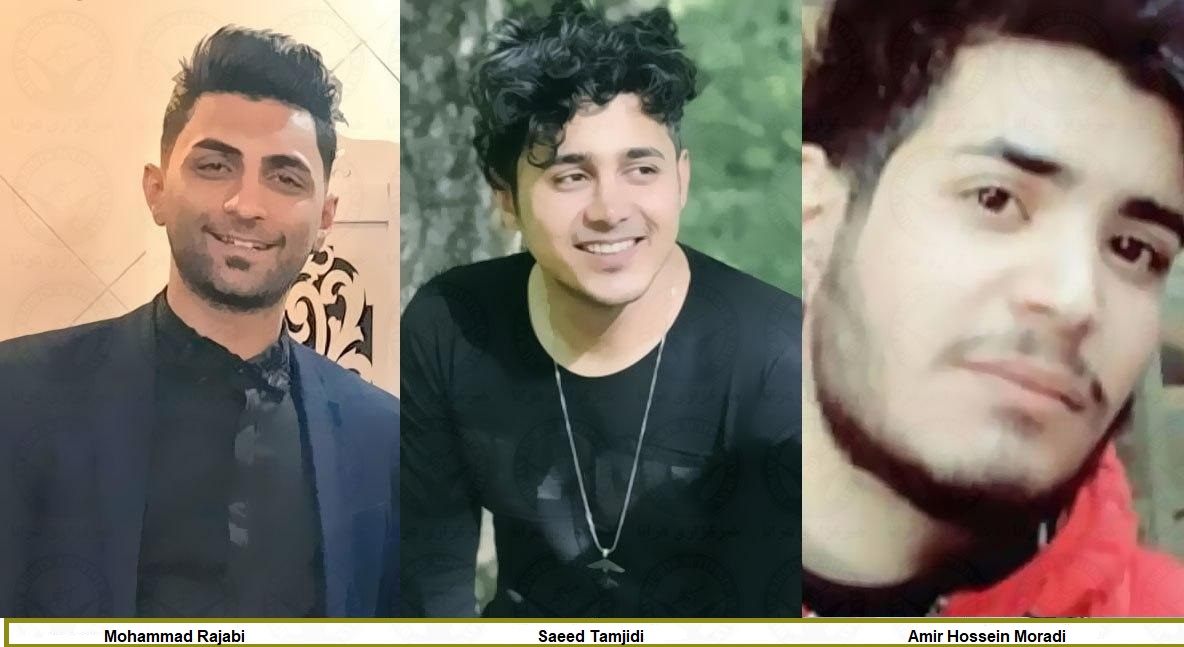Amir Hossein Moradi, Saeed Tamjidi, Mohammad Rajabi, and Mojgan Eskandari, and Shima R. who were arrested for their attendance in the last November protests were tried on the same case.
Mr. Moradi, Mr. Tamjidi, and Mr. Rajabi were sentenced to execution, imprisonment, and lashes.
They asked for an appeal request. But their lawyers have not yet filed an appeal request, so the court date and place are not scheduled. In addition, Mr. Tamjidi and Mr. Rajabi are going to find another lawyer.
Attending protest
On November 16, 2019, Amir Hossein Moradi, Saeed Tamjidi, and Mohammad Rajabi were attending protests on Sattar Khan street in Tehran where they accidentally met Mojgan Eskandari for the first time during the protests. According to a source close to Ms. Eskandari’s family, she met Saeed Tamjidi and Mohammad Rajabi during the last November protests in one of the streets in Tehran for the first time. She did not know them prior to that date. They were arrested together after they have been together briefly.
There is a fifth convict in this case named Shima R. (the family name is not revealed by HRANA for security reasons) who was not present at the protests but with a good deed and through helping and acting as an interpreter, happened to meet and know the convicts of this case.
Arrest
On November 19, Amir Hossein Moradi was identified and arrested by the security services (through observing the CCTV footage). Mr. Moradi was kept in a solidarity confinement cell in ward 240 and 209 of Evin Prison for a month. He was beaten by the security agents during his arrest and interrogation. He was then transferred to Greater Tehran Central Penitentiary.
Mojgan Eskandari was also identified by the help of CCTV footage and was arrested on December 10, 2019, by the security forces. She was eventually transferred to Qarchak Prison from the detention center of an intelligence organization upon completion of her interrogation.
Mohammad Rajabi and Saeed Tamjidi, and Shima R. entered Turkey illegally on November 20, 2019. They first went to Van and then went to Ankara. On their way from Ankara to Antalya, they were arrested and were transferred to the security police station in Antalya where they explained their situations and provided documents about their friend Amir Hossein Moradi’s arrest and requested to file for asylum. Turkish Police introduced them to a woman who was claimed to be a representative of the United Nation. They gave her all their documents such as proof of their attendance in protests and explained their cases to her with the help of an interpreter.
Although they were told by the police that if they want their asylum case processed, they should stay in asylum camp for a year, they were arrested by the Turkish police before being extradited to the officials of the Islamic Republic. on December 26, 2019, the police transferred them to the city of Agri close to the Iranian border by a bus without any food or water for two days.
On December 28, 2019, the police officers deported them along with 30 other people including Adel Bahrami. At the border, they were told that their names have been listed as “escaped from Evin Prison”. Then, they were transferred to the security police in Maku and since their warrant was issued on behalf of Tehran security police, officers from Tehran came and transferred them to the Gisha security police detention center and then Evin Prison. On January 4, 2020, Mr, Rajabi was released from Greater Tehran Central Penitentiary on 500 million Toman bail. On January 19, 2020, he was summoned to Tehran’s Revolutionary Court and was arrested. On the same day, judge Abolghasem Salavati canceled his set bail and issued an arrest warrant for him. Then, he was arrested and transferred to Greater Tehran Central Penitentiary.
Interrogation
Mr. Moradi was kept in a solidarity confinement cell in ward 240 of Evin Prison for a month. He was beaten by the security agents during his arrest and interrogation. A source close to his family told HRANA that Mr. Moradi told his family that he was attacked by stun gun, threatened to spend more time in solidarity confinement, and was promised to have medical treatment (he suffers from a kind of nervous system disease) to put pressure on him to do a forced confession. He added that during one of his 13 interrogation sessions, a security agent stood on Mr. Moradi’s chest which caused injury to his ribs. Moreover, Amir Hossein Moradi was threatened and beaten by the officers at Gisha security detention center and Evin Prison and eventually, he was forced to have videotaped forced confessions. Because he was assuming Mr. Rajabi and Mr. Tamjidi had left Iran and are safe, in his forced confessions, he said that he did the alleged crimes with them.
Mr. Rjabai, Mr, Tamjidi, and Shima R, were severely beaten at Gisha security detention center and were forced to confess against each other. Mohammad Rajabi and Saeed Tamjidi also said that they were beaten by the security police to pressure them to do a forced confession. A source close to them who wanted to stay anonymous told HRANA that they told their families that “We confessed under torture and most of the accusations are false such as cooperating with People’s Mojahedin Organization of Iran (Mojahedin-e Khalq) which is an excuse to execute us. we attended the protests, but we did not set any bank or any properties ablaze. They added that “we were tired of the injustice in the country and we went to the street to protest that”.
Trial
Amir Hossein Moradi, Saeed Tamjidi, Mohammad Rajabi, Mojgan Eskandari, Shima R. were tried and have two hearings on January 25-26, 2020 at Branch 15 of Tehran’s Revolutionary Court presided by Judge Abolghasem Salavati.
During the trial, Amir Hossein Moradi repeatedly mentioned that he confessed and was forced to have videotaped confession under pressure, torture, and threats and he denied all the charges. He added that he was assuming Mr. Rajabi and Mr. Tamjidi had left Iran and are safe, in his forced confessions, he said that he did the alleged crimes with them, but they did not do anything.
Also, Mohammad Rajabi told the judge that during interrogations he accepted things that he had never done, and he denied all the accusations.
According to a source close to the matter, Saeed Tamjidi and Mr. Rajabi were not allowed to choose a lawyer and their public defenders (Mr. Daryabeygi for Mr. Tamjidi) did not defend them properly and even told the judge that we are sad about his client’s actions.
The prosecutor’s representative, Amin Vaziri, accused them of planning the assembly and collusion since they attended protests on the other side of the city although they resided in the south side of Tehran. They responded that “we did not plan to be there, we were returning home from work, and on our way home we saw people chanting to protest the rise in fuel prices. We are humans and we got emotional because we were under financial pressure. We did not set any place on fire, you said that we set a gas station on fire but there is no gas station in a five kilometers radius of the place that we were at”.
Amin Vaziri (prosecutor’s representative)
Verdict
Branch 15 of Tehran’s Revolutionary Court presided by Judge Salavati on February 19, 2020, sentenced Amir Hossein Moradi to death on the charge of “cooperating in vandalism and arson with an intent to act against the Islamic Republic of Iran”, 15 years in prison and 74 lashes for the charge of “cooperation in aggravated armed robbery at night” and one-year imprisonment for the charge of “crossing the border unlawfully”.
Saeed Tamjidi, and Mohammad Rajabi: They were each sentenced to death on the charge of “cooperating in vandalism and arson with an intent to act against the Islamic Republic of Iran”, 10 years in prison and 74 lashes for the charge of “cooperation in aggravated armed robbery at night” and one-year imprisonment for the charge of “crossing the border unlawfully”.
The reason for sentencing him to execution was mentioned as instructing protesters, the leadership of the protests, and armed fight with the agents. He was accused of instructing protesters on Telegram to seize the camera while the security agents are filming protesters to protect protesters’ identities.
Mojgan Eskandari was sentenced to three years in prison for the charge of “assembly and collusion”. She was arrested on December 10, 2019.
Bio
Amir Hossein Moradi was born on August 6, 1994, in Tehran. He finished high school in computer science and was working as a cell phone, computer, and software seller in Tehran. He has two sisters.
Saeed Tamjidi was born on May 22, 1992, and he is an undergraduate student in electrical engineering. He is suffering from a nervous system disease. He immigrated to Germany, but he returned to Iran because of a family issue. He has a brother.
Mohammad Rajabi was born on August 12, 1994, and holds a high school diploma. He was working as a real estate agent. He has four brothers.
Mr, Moradi, Mr.Tamjidi, and Mr. Rajabi are residing in Khazaneh on the south side of Tehran. Their workplaces are in Ponak. They were providing for their families. They are now in section five of the Great Tehran Penitentiary.
Mojgan Eskandari was born in 1969. Ms. Eskandari is now in ward 1 (Mother’s ward) of Qarchak Prison in Varamin.
Shima R was born in 1969 and she was arrested because she helped Mr.Tamjid and Mr, Rajabi in Turkey.




